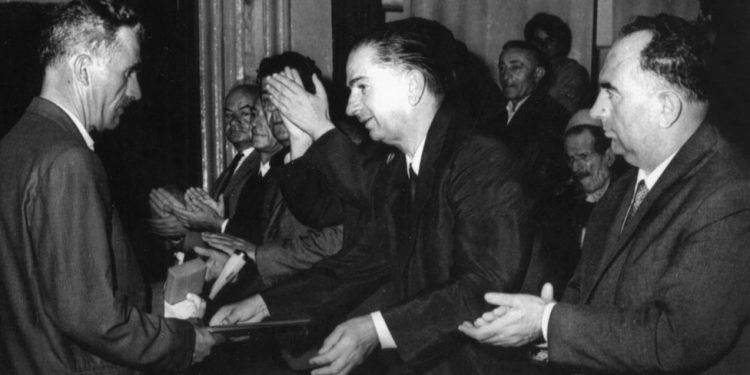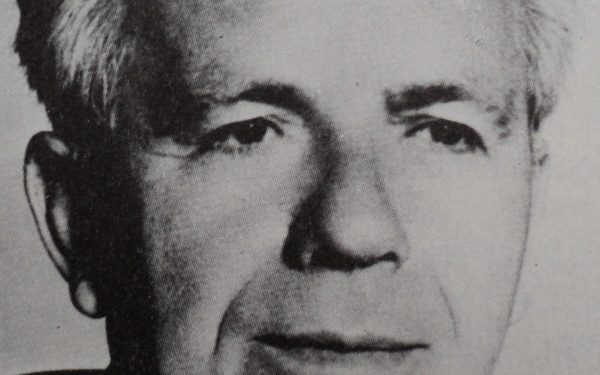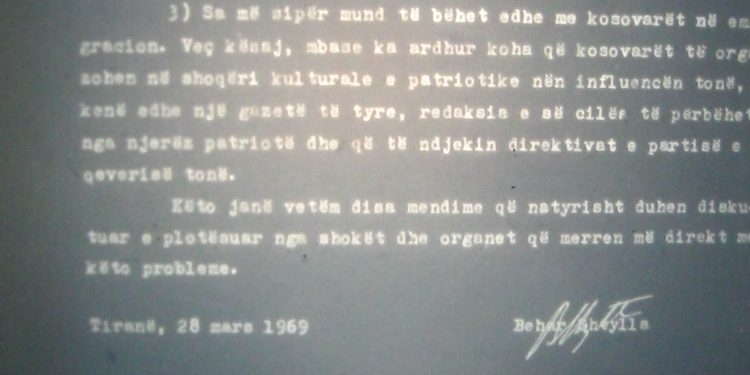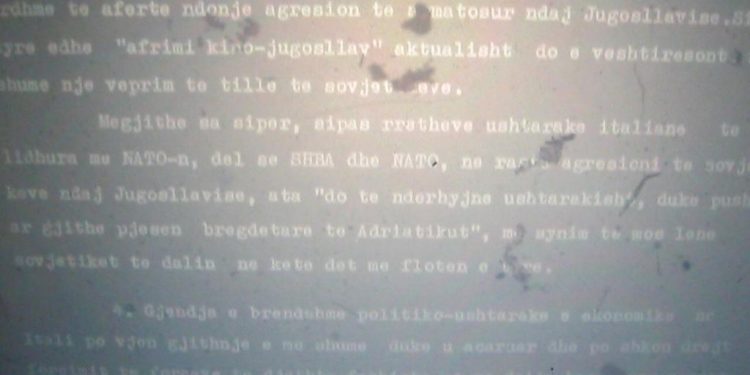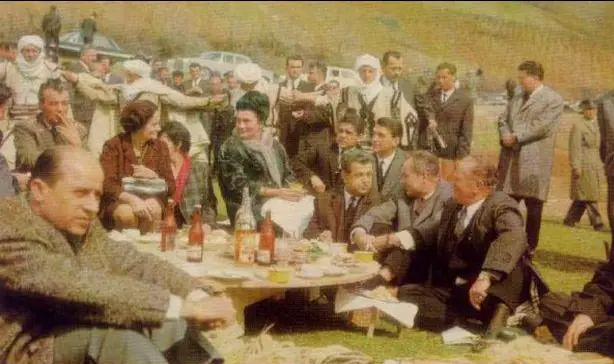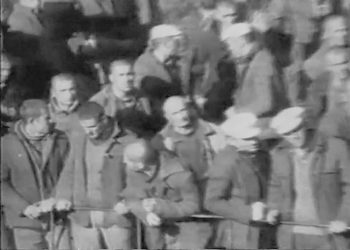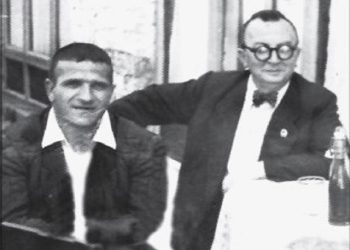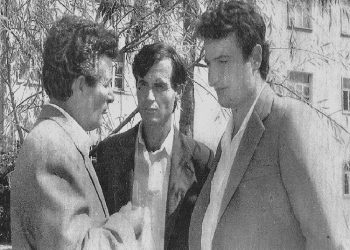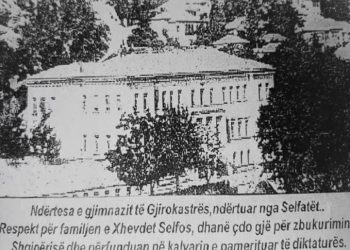Dashnor Kaloçi
Memorie.al publishes some archival documents issued by the Central State Archive in Tirana (fund of the former Central Committee of the ALP) which for years have been classified with the initials “Top secret” belonging to 1968, where is a correspondence of the Director of Albanian Political Intelligence, Jonuz Mersini, with Behar Shtyllën, Director of the Directorate of Foreign Relations in the apparatus of the Central Committee of the ALP, where the head of Albanian Intelligence, through an information report, announces with details about the development of events in the Balkan region and various European countries, as well as in Kosovo and throughout Yugoslavia at the time, where official Belgrade was in fear of a military aggression by the Soviet Union, as it had made in Czechoslovakia. Report-information of the First Secretary of the Party Committee of Tropoja District, Ali Kruja, sent to the Secretary of the Central Committee of the ALP, Hysni Kapo, in which he informs him in detail about the information received on the road by drivers Yugoslavs who came to get chrome ore in the Pac mine, in connection with the events in the province of Kosovo, where official Belgrade had begun large-scale military recruitment and training, to withstand any outside attack that might come their way. from the Soviet Union!
“On May 28, 1968, in Kosovo, a call was made under arms, born in 1950, 40 percent of the new recruits were kept in Kosovo, while the rest were sent to other Republics of Yugoslavia. Near Gjilan, on the Morava River, from the Republic of Serbia, some time ago preparations were made to start the construction of a hydropower plant that will flood 33 Albanian villages. To stop the construction of this hydropower plant, Fadil Hoxha and Veli Deva went to Tito, after which, by Tito’s order, the construction was suspended. This action has increased the authority of Fadil and Veli Deva in that area. “The hydropower plant would provide energy for Serbia.” This is stated, among other things, in an information report of 1968, with the logo “Top Secret”, of the Director of Political Intelligence at the Ministry of Foreign Affairs in Tirana, Jonuz Mersini, addressed to Behar Shtyllës, in the apparatus of the Central Committee of the ALP regarding the situation in the Autonomous Province of Kosovo, as well as in all of Yugoslavia at the time, where official Belgrade was under the anxiety and fear of a possible attack by the Soviet Union, as official Moscow had done to Czechoslovakia. Also, in addition to this document, regarding the situation in Kosovo and Yugoslavia, there is a report-information of the first secretary of the Party Committee of Tropoja district, Ali Kruja, sent to the secretary of the Central Committee of the ALP, Hysni Kapo, regarding the development of events in Kosovo and Yugoslavia at that time. For more about these, as well as a detailed information report of the Albanian Intelligence, for the events in some countries of the Balkans, Europe and North Africa, we know the documents in question, which Memorie.al, publishes in full in this writing.
Report of the Director of Intelligence at the Ministry of Foreign Affairs, Jonuz Mersini, on Behar Shtylla, to the Central Committee of the ALP
THE PEOPLE’S REPUBLIC OF ALBANIA VERY SECRET
DISCOVERY DIRECTORY
SAMPLE
NR.4 Nr. 19
Tirana, July 19, 1968
Comrade Behar
I N F O R M A C I O N
- On 28 May 1968, 40 percent of the new recruits were recruited to Kosovo under arms, born in 1950. They kept them in Kosovo, while the rest were sent to other Yugoslav Republics.
- Near Gjilan, on the Morava River, from the Republic of Serbia, some time ago preparations were made to start the construction of a hydropower plant that will flood 33 Albanian villages. To stop the construction of this hydropower plant, Fadil Hoxha and Veli Deva went to Tito, after which, by Tito’s order, the construction was suspended. This action has increased the authority of Fadil and Veli Deva in that area. The hydropower plant would provide energy for Serbia.
- During the academic meeting to commemorate the 500th anniversary of Skanderbeg’s death, the youth and intellectuals of Gjilan expressed in many other cities their love for the People’s Republic of Albania and the leadership of the Party of our country, chanting slogans such as “Long live Skënderbeu”, “Long live Enver Hoxha”, “O man, that Skënderbeu came”, etc.
- To this manifestation of the patriotic feelings of the people of Gjilan, the Serbs responded with chauvinist counter-slogans written or scattered or pasted on the walls, such as: “Down with Skanderbeg”, “Kosovo belongs to Serbia”, “Down with Albania”, “Down “Tito”, “Long live Serbia”, “Long live Tsar Dushani”. For this, 15 Serbs have been arrested in Gjilan, who are still in prison untried and unpunished.
-Provinces to directly elect an independent delegation to the House of Nations of the Federal Assembly
-In the Republican Constitution, to determine in a more complete way the way provided for the conditions for the realization of the equality of the language of the peoples and nationalities.
- In Kosovo and abroad, the echo continues for the science delegation of the State University of Tirana, which participated in the Pristina symposium dedicated to the 500th anniversary of Skanderbeg’s death. It speaks with sympathy and admiration for their statements and the conversations they had with honest Kosovars. This has increased the love, respect and trust of Kosovars towards our country. On the other hand, as the days go by, patriotic feelings and demands for rights are becoming more pronounced among the people of Kosovo.
Faced with such a situation, the Yugoslav government in various forms, is taking measures for a stronger control of the Albanian population in Kosovo, especially among intellectuals and young people, as well as for a restriction, possibly as large as possible. Kosovars with Albania. They have instructed the competent federal, republican (Serbia) and provincial (Kosovo) bodies to tactfully avoid Kosovo’s relations and contacts with Albania, to gradually withdraw from their advanced requests, made for contacts and exchanges with our country, and establish better control over those institutions or persons that manifest anti-Serb and pro-Albanian sentiments.
This situation, although in the first steps, is being understood by the Kosovar masses, especially by the patriotic and anti-Tito cadres, and they are worried about the fact that maybe in the future they can gradually start to restore the situation that was before the IV Plenum. of Brion.
Our sources, as well as the honest Kosovar patriots and cadres, with whom we have contacts on various occasions, suggest that now is the time for our country, using various occasions, to send artistic theater groups from Kosovo to our country and ensemble, as well as various sports teams, whether accepting reciprocity, because this will create an extremely patriotic and enthusiastic situation in Kosovo and, of course, would serve the issue of increasing patriotic feelings and connecting love as much as possible for Albania, or would make the Titoists not accept these groups in Kosovo and this would equally have its effect in favor of Kosovars and Albania and against Titoist demagoguery there. We think that their requests will be met using the cases that may arise.
Comrade Beqir
You may have received information from other sources, however I am sending this information to K.P. Tropoja, because addressing this issue can serve the military. After you look at them, give them back to me. Look at Petrit and Discovery and then turn it over. B.
(Hysni Kapo) 11.10.1968.
For Greece
From various data collected from our sources in the country and in Greek emigration to Western countries, it turns out that the situation in Greece continues to be unstable. The arrests and persecutions of the opposition elements of the Junta, as time goes by are becoming even more pronounced, for the fact that even the opponents of the current government over time began to come out of the shock in which they found themselves after the coup and are doing attempt for a more active and organized resistance.
This is especially noticeable in the main cadres of the Mediterranean Navy, where the Papandreou Center Party has had a stronger base and is confirmed by the fact that this weapon is being attacked more than anywhere by the Junta. Even the “reforms” in favor of the peasantry, made by the military government, as well as the 450 million dollars that the American and West German capitalists invested during a year, did not help to stabilize the internal situation.
From the information obtained close to the officials of the Greek embassy in Paris, the military junta is making efforts to form a Political Party of its own, through which to legalize the retention of power. But contradictions have arisen in its bosom regarding the program of this Party. They are divided into two main groups as follows:
The Macarezos and Lados group seeks to orient the Party to a far-right, extremist domestic and foreign policy closely linked to the Americans, NATO and their supporters. The other group, which is said to be led by Papadopoulos himself, is for a political program similar to that of Nasser and for a rapprochement with Eastern countries. The group is said to be backed by new officers from the Thessaloniki garrison and military schools, but its positions are not yet consolidated.
This uncertain internal conjuncture, the Greek military junta seeks to compensate in its favor with measures and initiatives of “goodwill”, in foreign policy, and especially with its neighboring countries. As we have reported in previous information, they are continuing their efforts to normalize their relations with Turkey, Bulgaria and Yugoslavia.
In this regard, a source in Ankara informs us that Papadopoulos sent a message to Demirel in early June, proposing that both sides resolve their differences over the Cyprus problem. As a more appropriate path to this, Papallopoulos suggests that Cyprus remain an independent country and that Greece and Turkey drop their claims to the island.
The Greek Prime Minister emphasizes that such a step would create all possibilities for the establishment of good neighborly relations between the two countries. By leaving Cyprus an independent and sovereign state, the open wounds will be closed once and for all and the quarrels caused between Greece and Turkey will be extinguished. In the end, Papadopoulos expresses the belief that the Turkish side will also respond to this will and desire shown by the Greek side.
The Turkish government has not yet responded to the above. Xhelal Bajari said that he will do his best for the Turkish Prime Minister to accept the Greek proposal.
- In recent days, from our sources in Paris and Istanbul, we are again served with data that speak of the desire of the Greek government to find the moment to enter into negotiations to normalize relations with our country.
The Greek consul in Paris, in a conversation with our source, said that the Greek government is interested in normalizing relations with Albania, and leaving aside the complex problem of “North Epirus” and how to serve it. (ie the Greek government), will soon take measures to prepare the domestic public by giving up the propaganda campaign against Albania. And after that the Greek government will seek to find the opportunity to take the initiative.
Yes, regarding this issue, another source of ours in Istanbul, informs us that in the districts of the Patriarchate and the Greek consulate there, it is said that the Greek government will soon take the initiative to normalize relations with Albania, because according to them this have also been approved by the Americans. In the Greek elements in Istanbul, it is said that soon the Greek government will knock on the door of Albania.
For his part, Foreign Minister Pipinelis, in a recent press interview, where he did not mention our country at all, stressed, among other things, that Greece’s relations with Bulgaria and Romania, especially those with Yugoslavia and Turkey., have improved considerably. And below he added that: Greece is ready to work out a new status regarding the relations between the Balkan states.
For the Soviet fleet in the Mediterranean.
Following the Israeli-imperialist aggression against the Arab countries, the Soviet Navy in the Mediterranean consists of the following units:
A 10,000-ton cruise missile equipped with K.A.
4 pedestrians-type “Kotlin” of 2,900 tons each, equipped with K.A. missiles. sea-air class,
A 5,000-ton Kashin-type pedal boat, which in addition to missiles has a platform for helicopters, 6 submarines, some of which are with atomic engines, 14 torpedo boats, 15 transport ships and 15 support ships for the supply of fleet.
According to the data, in addition to the ship’s crew, the fleet also includes naval infantry forces, specially trained and intended for landing. They are complete with modern landing gear.
Currently the Soviets for their Mediterranean fleet, have secured one base in Syria and three bases in the RAB (Port Said, Alexandria and Siji-Baren near the border with Libya). Now they are trying to secure a suitable base for themselves in Algeria, but they have not yet been able to convince the Algerians of this.
This fleet makes its supply in the above-mentioned Arab ports. However, Soviet revisionists have made several attempts to secure a residence and supply base on the Yugoslav coast. It was initially said that Tito did not accept, because that would give the Americans a reason to cut off aid to Yugoslavia. But from other data, it turns out that during his last visit to Moscow, in talks with Brezhnev, he agreed that the Soviet fleet should only be supplied to the port of Boka-Kotorska, whenever needed, and for this a term agreement for 4 years.
According to a source close to the Turkish military districts, during the five months of this year, 68 Soviet warships of various types passed through the Dardanelles towards the Mediterranean Sea. According to the source, for crossing the Dardanelles, it is enough for the Soviets to present to the Turkish authorities the permission they have obtained for anchoring in one of the Arab countries and three days after that, the ships can pass through this strait according to the international convention in peacetime.
Although the existence of the Soviet fleet in these waters, they are part of the Soviet-American agreement on the division of zones of influence that was established in the secret Glasgow talks, in the countries of Western Europe, and especially in those of the Mediterranean basin, from day to days show signs of concern and fear for Soviet intentions in the Mediterranean and accuse the White House of not taking seriously the presence of this force and its intentions in the Mediterranean.
They are also concerned about the fact that so far, they have not been able to provide accurate data on the strike force of this fleet. To face any kind of surprise they have insisted and at the last session of the NATO Council, it was decided that in the future there will be a closer coordination of military actions between the 6th US Fleet. and the English, Italian, Greek, and Turkish fleets in the Mediterranean. In the framework of these requirements, NATO countries have conducted a series of military-naval maneuvers in the area with the participation of these forces. /Memorie.al
Continues tomorrow




